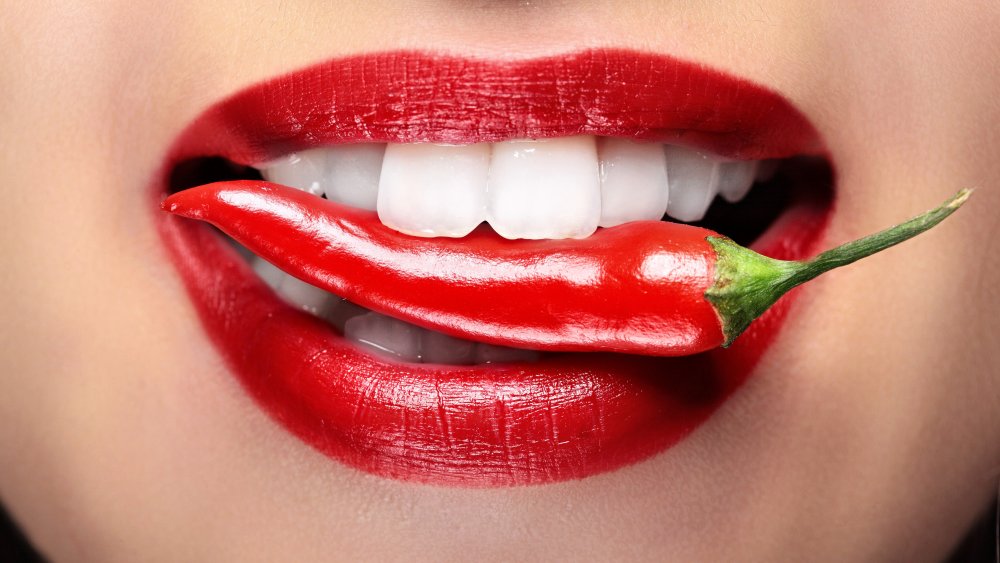Here's What Happens When You Eat Spicy Food Every Day
We may receive a commission on purchases made from links.
Are you a real hothead, at least when it comes to food? Do you watch every episode of Hot Ones and gleefully giggle to see those celebs in pain, since you know you'd have no trouble whatsoever chowing down on The Last Dab-soaked tenth wing? Do you put hot sauce on your hot sauce, then garnish it with a sprinkling of chopped Carolina Reapers?
If only the spiciest of spicy foods are your ghost pepper jam, if your idea of a trip to Flavortown is more like other people's vision of the ninth circle of hell, if you scoff at a few million Scoville units...well, you get the picture. If all of this describes you, then for you a day without nuclear meltdown-level heat may be unthinkable. But what does your body think of all this chili consumption? Does it do more good than harm to eat spicy food every day, or could the opposite be true?
Your body could be more disease-resistant
Registered dietician Bonnie Taub-Dix says that capsaicin, which is the active component in hot peppers and thus the substance that gives spicy foods their heat, has powerful anti-inflammatory properties. What's more, as she told told Women's Health, "reducing inflammation has a positive effect on fighting heart issues and cancer." Good news indeed! In addition to combating such serious diseases, capsaicin is also a natural remedy that can treat muscle aches, joint pain, and arthritis. It can also help to ward off sniffles and sneezes due to its antioxidant and antimicrobial properties. Add a little capsaicin to your diet, perhaps by drinking cayenne tea, and enjoy benefits such as a more robust immune system and protection against bacteria.
You might just lose a little weight
Capsaicin is also known to boost your body's metabolism by increasing your internal temperature, thus allowing you to quite literally burn off more calories. It can also help your body to burn more fat, as well. What's more, spicy foods can also increase your feeling of fullness after a meal, so you're less likely to go back for seconds. They can even help to curb sugar cravings, since after eating something super-hot, you usually don't want to follow up with the taste of something sweet.
With all this being said, though, spicy food isn't any kind of diet miracle, no more so than any other type of snake oil advertised as being able to melt off pounds in an instant. As Taub-Dix said to Women's Health, "I wouldn't rely on it as a weight loss method," but a little spice sure can make a healthy, low-calorie diet taste a whole lot better.
Your mood might be brighter
The capsaicin in spicy foods can have an effect on your brain as well as your body. It seems that the temporary pain you feel from eating the heat causes a rush of pain-relieving endorphins, comparable to a "runner's high" (sweat and all), and also triggers the feel-good chemical dopamine. Taub-Dix notes that the heat-induced pain signals can also release serotonin, the neurotransmitter that helps to boost mood and alleviate depression. According to Healthy News 24, the capsaicin rush can also help to alleviate other negative emotions such as anger and frustration. Capsaicin alone cannot be a miracle cure, however, and depression or other mental health issues are best treated by seeking professional help.
You could have trouble sleeping
It's not all sunshine and serranos when it comes to spicy foods, however. They do have some negative effects on your body, one of which may be interfering with your sleep cycle. According to Health Guide Info, one Australian study found that people who consumed spicy foods not only took a longer time to fall asleep, but they also spent less time sleeping. One possible reason put forward as to why eating spicy food leads to disrupted sleep lies in the fact that it tends to raise body temperatures. While a higher body temperature is good for metabolism, it's not so great when it comes to getting a good night's sleep.
You may experience some digestive distress
Yet another reason your sleep might be interrupted after you've eaten spicy food could be because you keep having to wake up and attend to the urgent call of nature. There's a reason why certain types of spicy cuisine could have you dancing the Tijuana Two-Step — as VeryWell Health explains, capsaicin can irritate the stomach lining and lead to a bad case of the runs.
What's more, peppers can be as pain-inducing on the way out as they were going in. There's even one popular brand of hot sauce named for this phenomenon, which is known as "Fire in the Hole," as well as numerous others referencing it with names such as Bayou Butt Burner.





